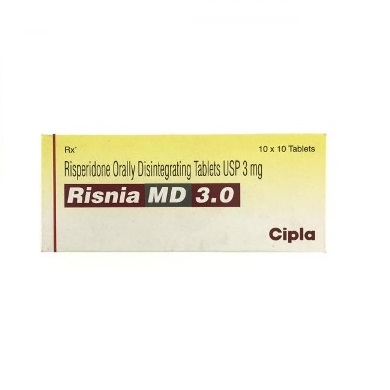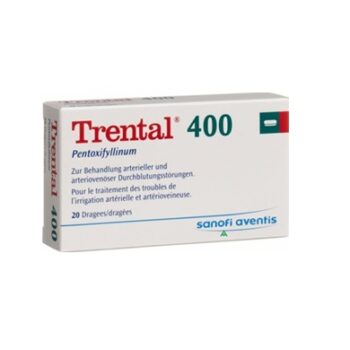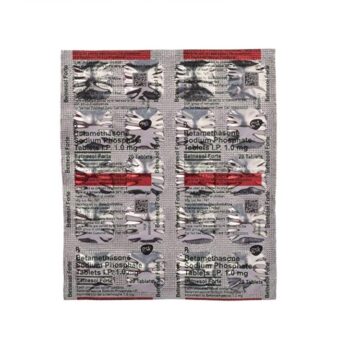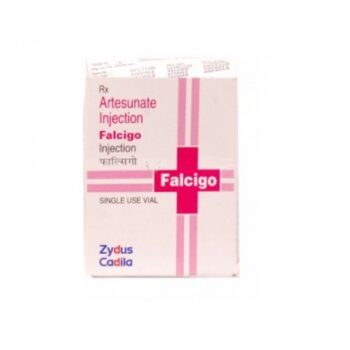Risnia 3mg
Risnia 3mg is a prescription medication primarily used to manage symptoms of schizophrenia and bipolar disorder. It contains risperidone, an atypical antipsychotic that works by balancing dopamine and serotonin in the brain, helping to reduce hallucinations, delusions, and mood swings.
This medicine is often prescribed when patients exhibit aggression, severe mood fluctuations, or disorganized thinking. It is important to take Risnia 3mg exactly as directed by a healthcare provider to avoid side effects such as drowsiness, weight gain, or extrapyramidal symptoms.
Regular monitoring ensures optimal benefit. Never stop the medication abruptly without medical advice.
Uses
- Schizophrenia – Helps manage symptoms such as hallucinations, delusions, and disorganized thinking.
- Bipolar Disorder – Controls manic or mixed episodes, stabilizing mood swings.
- Irritability in Autism – Used to treat aggression, self-injury, and severe temper tantrums in children and adolescents with autism.
- Psychotic Disorders – Effective in treating various forms of psychosis by balancing brain chemicals.
- Behavioral Disorders – Sometimes used off-label to manage severe behavioral problems in certain conditions.
How to use it ?
Risnia 3mg should be taken exactly as prescribed by your doctor. It is usually taken once or twice daily, with or without food. Swallow the tablet whole with water, and try to take it at the same time each day to maintain consistent blood levels.
Do not skip doses or stop taking it suddenly without medical advice, as this can worsen symptoms. Your doctor may start you on a low dose and gradually increase it based on your response.
How dose it works ?
Risnia 3mg contains risperidone, an atypical antipsychotic that works by affecting the activity of certain neurotransmitters in the brain, mainly dopamine and serotonin. These chemicals influence mood, behavior, and perception.
In conditions like schizophrenia and bipolar disorder, dopamine levels may become imbalanced, leading to symptoms like hallucinations or extreme mood swings.
Risperidone helps restore this balance by blocking dopamine D2 and serotonin 5-HT2A receptors, reducing abnormal brain activity. This leads to improved thinking, mood stabilization, and reduced aggression or irritability.
Dosage
Dosage varies depending on the condition, age, and individual response.
- Schizophrenia (Adults): Typically starts at 1–2 mg per day, gradually increased to 4–6 mg/day.
- Bipolar Disorder (Adults): Usually 2–3 mg/day, adjusted based on response.
- Irritability in Autism (Children): Starts low (0.25–0.5 mg), increased slowly.
- Older Patients: Often begin at 0.5 mg twice daily.
Benefits of Risnia 3mg
- Reduces psychotic symptoms such as hallucinations and delusions in schizophrenia.
- Stabilizes mood swings in bipolar disorder, preventing manic and mixed episodes.
- Improves behavior in children with autism by reducing aggression, irritability, and self-injury.
- Enhances thinking and clarity, helping patients regain social and occupational functioning.
- Quick onset of action compared to some older antipsychotics.
- Fewer movement-related side effects than traditional antipsychotics.
Side Effects of Risnia 3mg
- Drowsiness or sedation
- Weight gain
- Increased appetite
- Dizziness or lightheadedness
- Fatigue
- Anxiety or restlessness
- Tremors or muscle stiffness (extrapyramidal symptoms)
- Dry mouth or increased saliva
- Constipation
- Menstrual changes or breast enlargement (due to hormonal effects)
Serious side effects (rare): Tardive dyskinesia, neuroleptic malignant syndrome, or high blood sugar.
Precautions
- Medical History: Inform your doctor if you have heart, liver, kidney problems, diabetes, seizures, or Parkinson’s disease.
- Older Patients: Increased risk of stroke in older people with dementia-related psychosis—use with caution.
- Pregnancy & Breastfeeding: Use only if clearly needed and prescribed by a doctor.
- Alcohol & Sedatives: Avoid, as they can increase drowsiness and side effects.
- Driving & Machinery: May cause drowsiness or dizziness—avoid such activities until you know how it affects you.
- Regular Monitoring: Blood sugar, weight, and cholesterol should be checked periodically.
Frequently asked questions
What is Risnia 3mg used for?
Risnia 3mg is used to treat schizophrenia, bipolar disorder, and irritability associated with autism. It helps control symptoms like hallucinations, mood swings, and aggression.
How long does it take for Risnia 3mg to work?
It may take a few days to notice initial improvement, but full effects often take 2–6 weeks. Patience and regular use are important.
Can I stop taking Risnia 3mg suddenly?
No, stopping suddenly may worsen your symptoms. Always consult your doctor before discontinuing or changing your dose.
Is Risnia 3mg safe for children?
Yes, under medical supervision. It is sometimes prescribed for children with autism to manage behavioral issues.
Does Risnia 3mg cause weight gain?
Yes, weight gain is a common side effect. Monitoring diet and physical activity is recommended.
Can I drink alcohol while on Risnia 3mg?
It’s best to avoid alcohol, as it can increase drowsiness and reduce the effectiveness of the medication.
What should I do if I miss a dose?
Take it as soon as you remember. If it’s close to your next dose, skip the missed one. Do not double up to make up for it.
Is Risnia 3mg habit-forming?
No, it is not addictive. However, it should be used exactly as prescribed to prevent complications.
Conclusion
Risnia 3mg (Risperidone) is an effective medication for managing symptoms of schizophrenia, bipolar disorder, and autism-related irritability. While it provides significant benefits, such as mood stabilization and symptom reduction, it is important to use it under medical supervision due to potential side effects. Regular monitoring and adherence to prescribed dosages are essential for optimal results.












Reviews
There are no reviews yet.